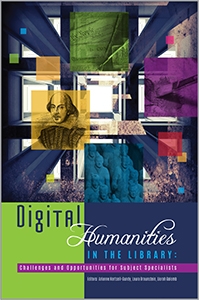Primary tabs
You don't need to be an ALA Member to purchase from the ALA Store, but you'll be asked to create an online account/profile during the checkout to proceed. This Web Account is for both Members and non-Members.
If you are Tax-Exempt, please verify that your account is currently set up as exempt before placing your order, as our new fulfillment center will need current documentation. Learn how to verify here.
- Description
- Table of Contents
- About the authors
- Reviews
Digital Humanities in the Library: Challenges and Opportunities for Subject Specialists is a collection of essays focusing on the role of the subject specialist in creating, supporting, and promoting digital humanities projects. Chapter authors include experts from diverse areas, such as humanities subject specialists, digital humanities librarians, special collections librarians, and professors and graduate students from many disciplines.
This book, published in collaboration with the ACRL Literatures in English Section and with a foreword by Joan K. Lippincott, provides valuable discussions around the role of subject specialists in digital humanities, gives practical advice regarding support of and collaboration with digital humanities projects, and describes real-world examples to inspire subject specialists to increase their own knowledge and expertise.
Digital Humanities in the Library was Arianne Hartsell-Gundy, Laura Braunstein, and Liorah Golomb, and is appropriate for all types of academic libraries and collections devoted to Library and Information Science.
Now available as an Open Access publication from ACRL!
ForewordJoan K. Lippincott
IntroductionLaura R. Braunstein, Liorah Golomb, and Arianne Hartsell-Gundy
Part 1. Why Digital Humanities? Reasons for Subject Specialists to Acquire DH Skills
Chapter 1. Traversing the Gap: Subject Specialists Connecting Humanities Researchers and Digital Scholarship Centers Katie Gibson, Marcus Ladd, and Jenny Presnell
Chapter 2. Moderating a Meaningful DH Conversation for Graduate Students in the HumanitiesKathleen A. Langan and Ilse Schweitzer VanDonkelaar
Chapter 3. Construction and Disruption: Building Communities of Practice, Queering Subject LiaisonsCaro Pinto
Chapter 4. Distant Reading, Computational Stylistics, and Corpus Linguistics: The Critical Theory of Digital Humanities for Literature Subject LibrariansDavid D. Oberhelman
Part 2. Getting Involved in Digital Humanities
Chapter 5. Digital Humanities Curriculum Support inside the LibraryZoe Borovsky and Elizabeth McAulay
Chapter 6. A Checklist for Digital Humanities ScholarshipElizabeth Lorang and Kathleen A. Johnson
Chapter 7. In Practice and Pedagogy: Digital Humanities in a Small College EnvironmentChristina Bell
Part 3. Collaboration, Spaces, and Instruction
Chapter 8. Digital Humanities for the Rest of UsJudy Walker
Chapter 9. Collaboration and Co¬Teaching: Librarians Teaching Digital Humanities in the ClassroomBrian Rosenblum, Frances Devlin, Tami Albin, and Wade Garrison
Chapter 10. Spaces, Skills, and SynthesisAnu Vedantham and Dot Porter
Part 4. Projects in Focus: From Conception to Completion and Beyond
Chapter 11. A Digital Adventure: From Theory to PracticeValla McLean and Sean Atkins
Chapter 12. "And There Was a Large Number of People": The Occom Circle Project at the Dartmouth College LibraryLaura R. Braunstein, Peter Carini, and Hazel-Dawn Dumpert
Chapter 13. Dipping a Toe into the DH Waters: A Librarian's ExperienceLiorah Golomb
Chapter 14. Second Time Around; or, the Long Life of the Victorian Women Writers Project: Sustainability through OutreachAngela Courtney and Michael Courtney
Appendix. Tools and Resources Referenced in this Book
Contributors
Arianne Hartsell-Gundy
Arianne Hartsell-Gundy is the Head, Humanities and Social Sciences Department and librarian for literature at Duke University. She was previously the humanities librarian at Miami University in Ohio. She holds a dual masters degree in Comparative Literature/Library Science at Indiana University, and a BA in English from the University of Missouri-Columbia. Her research interests include information literacy, graduate student pedagogy, collection analysis, and digital humanities. She is the co-editor of Learning in Action: Designing Successful Graduate Student Work Experiences in Academic Libraries and Digital Humanities in the Library: Challenges and Opportunities for Subject Specialists.
Laura R. Braunstein
Laura R. Braunstein is the Digital Humanities and English Librarian at Dartmouth College. She has a doctorate in English from Northwestern University, where she taught writing and literature classes. She has worked as an index editor for the MLA International Bibliography, and serves as a consultant for the Schulz Library at the Center for Cartoon Studies in Vermont. Her research interests include collaborative learning, using archival materials in teaching, and the impact of the digital humanities on teaching and learning.
Liorah Golomb
Liorah Golomb is associate professor and humanities librarian at the University of Oklahoma. She holds a doctorate in Drama from the University of Toronto and earned her MLIS at Pratt Institute. She has published several articles and chapters both within and outside of the field of librarianship. Her most recent publication is “’My Kind of Librarian or Your Kind of Library?’: Information Seeking Behavior in Supernatural,” in Loremasters and Libraries in Fantasy and Science Fiction, edited by Jason Fisher and Janet Brennan Croft.
"Provides a ‘here's what we did' approach to understanding how subject librarians can become more involved in digital humanities."
— ARBA



